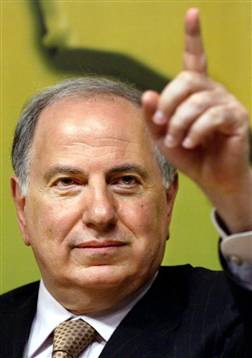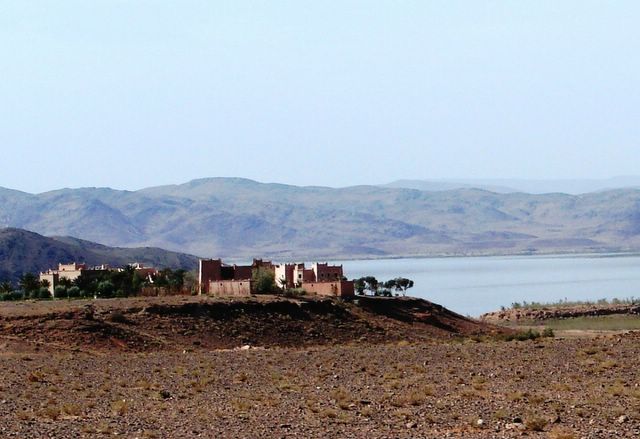The Improbable Comeback of Ahmad Chalabi
.
 As the winning Shiite coalition of Ayatollah Ali Sistani debates who will be its candidate for Prime Minister, two names are being mentioned as strong contenders for the job. The first is Ibrahim Jafari, the head of the Shiite Dawa party and considered by many to be close to Iran, and the second is the notorious Ahmad Chalabi, head of the Iraqi National Congress (INC). It may very well turn out that Jafari gets the nod for the PM post but Chalabi is now in a position of strength and will most likely play an important role in whatever government emerges following the recent election in Iraq.
As the winning Shiite coalition of Ayatollah Ali Sistani debates who will be its candidate for Prime Minister, two names are being mentioned as strong contenders for the job. The first is Ibrahim Jafari, the head of the Shiite Dawa party and considered by many to be close to Iran, and the second is the notorious Ahmad Chalabi, head of the Iraqi National Congress (INC). It may very well turn out that Jafari gets the nod for the PM post but Chalabi is now in a position of strength and will most likely play an important role in whatever government emerges following the recent election in Iraq.This is major league politics all around. The surgical way in which Chalabi has maneuvered to position himself politically in Iraq is deserving of a salute from even the shrewdest politicians in the World. If you are not convinced, then consider the road he took to where he now stands. This is after all the same Chalabi who was practically left for dead in the political swamps of Iraq following some very damaging allegations of fraud and spying. But, first let us rewind the tape to pre-war Iraq. Chalabi during this period managed to become very popular within powerful U.S. policy circles through his friendship with prominent neoconservatives and his willingness to feed largely bogus intelligence information about Iraq’s weapons programs to the U.S. government. In return, he was able to receive millions in U.S. tax-payers money to build his Iraqi National Congress into a credible political force.
Once he had the U.S. committed to a military confrontation, he was already halfway to his ultimate political goal in Iraq. The problem was that he was less popular among Iraqis than Saddam at the time he was airlifted into Iraq by the Pentagon shortly after the fall of Baghdad. He was seen as a U.S. puppet by most Iraqis and could not win an election to save his life in that country. So, good old Chalabi had to find a way to gain legitimacy in Iraq and dispel the belief that he was indeed a U.S. puppet. That was right around the period when Moqtada Sadr (a Shiite cleric) launched his militant campaign against the U.S. It is then that Chalabi made his first move in what became his new political strategy in Iraq. He started to publicly contradict U.S. officials and to advocate that the U.S. should surrender more political control to Iraqis. He started slowly to build the perception that he was now at odds with the U.S. by becoming a pain in the side of Coalition Provisional Authority (CPA) administrator Paul Bremer and raising a few eye brows in the halls of Congress.
Then a leak hit Washington faster than a lightening rod. Chalabi may have shared U.S. intelligence with the Iranians. In addition, the CPA secured a warrant from an Iraqi judge to search Chalabi’s offices in Baghdad and leveled accusations of bank fraud against him. To make matters worse, Chalabi’s nephew, who had been put in charge of the tribunal that is to try Baatists including Saddam, was accused of murder. The media and some congressmen from both sides of the aisle went to town on the Chalabi story. Headlines such as “fall from grace” and “falling out of favor” started to describe Chalabi’s relationship with the U.S. government. The Pentagon, where most of his supporters are, announced that it was cutting off all funding to Chalabi’s INC.
When many seemed ready to condemn Chalabi, an old friend stayed adamant about defending him. That old friend was Richard Perle. It is a mystery why a prominent neoconservative insider would stake his position in defense of an Iraqi politician charged with breaching national security to benefit one of the most ferocious enemies of the United States. Maybe it was but a case of personal loyalty, or maybe there was something more sinister to it. A calculated leak to redefine Chalabi’s political identity in Iraq and rid him of the ‘U.S. puppet’ label in hope that he builds real political legitimacy among Iraqis, you may ask. Maybe on the surface some wanted to give the impression that bridges were being burned between Chalabi and his old allies in Washington all while doing just enough in the background to make sure things did not go too far. I am not a fan of conspiracy theories, but if this were to be the case, it would be one of the most daring rounds of high-stakes political poker in recent history.
Following the scandal, Chalabi laid low as the UN envoy, Lakhdar Brahimi, recommended with the blessing of the U.S. that Ayad Allawi be put in charge of the provisional government. Ahmad Chalabi did not like seeing his longtime rival Allawi in charge, but he did not fight the decision either. In the highly volatile situation in which the provisional government was asked to govern, he figured that there would be plenty of opportunities for him to maneuver politically in preparation for the 2005 elections. From outside a government that was facing the rising dissatisfaction and anger of Iraqis; from outside a government that was being seen by an increasing number of Iraqis as the enabling agent of the ‘US occupation’; from outside a government that was facing an increasing insurgency, Ahmad Chalabi maneuvered his way into the higher tier of the Shiite coalition blessed by the influential Ayatollah Ali Sistani. He is now one of two names considered for the post of prime minister following the recent elections in Iraq.
In politics of this caliber, things are never what they seem to be. Ahmad Chalabi is first and foremost a mathematician (he holds a PhD in Mathematics). He came, he adjusted and, at least for now, he defied reason to achieve some illogical outcomes.


























3 Comments:
In short, his primary interest is not that of U.S. or of Iraq,but his own. Obviously someone like Chalabi can't be trusted. On the other hand, he's obviously a very smart politician. What would you say his policy be if he were to win the post?
February 21, 2005
Thank you for commenting on this article. Today, it was announced that Chalabi dropped out of the PM race, leaving Jafari as the only contender for the job. This did not surprise me. Chalabi's politics are now carefully aligned with the Shiite nationalist movement. He is conciliatory towards Moqtada Sadr, friendly towards Iran, and looking to increase the perception that he's now at odds with the U.S.
He knows that being seen as an ally of the U.S. is a prescription for political failure in Iraq. What is going to be interesting is how he will handle the post-election demands of what is now his base (Sadr and Sistani followers). Because I guarantee you that once the new government is in place, Sadr and his Mahdi Army will demand the withdrawal of U.S. troops. The president says it won't happen. You can bet that this will be the source of renewed armed conflict between the U.S. and Sadr's fighters. This will put Iraqi politicians in a very tough spot because Sistani will come out in favor of a withdrawal. I think Chalabi will walk a very delicate line when that happens.
February 22, 2005
Does he have any political future? I wonder how long he'll be able to pull off walking that delicate line. Eventually someone has to see through his game. I bet at the first opportunity he'll switch sides again. I doubt he'll be able to stay aligned with the Shi'a for long.
February 22, 2005
Post a Comment
<< Home